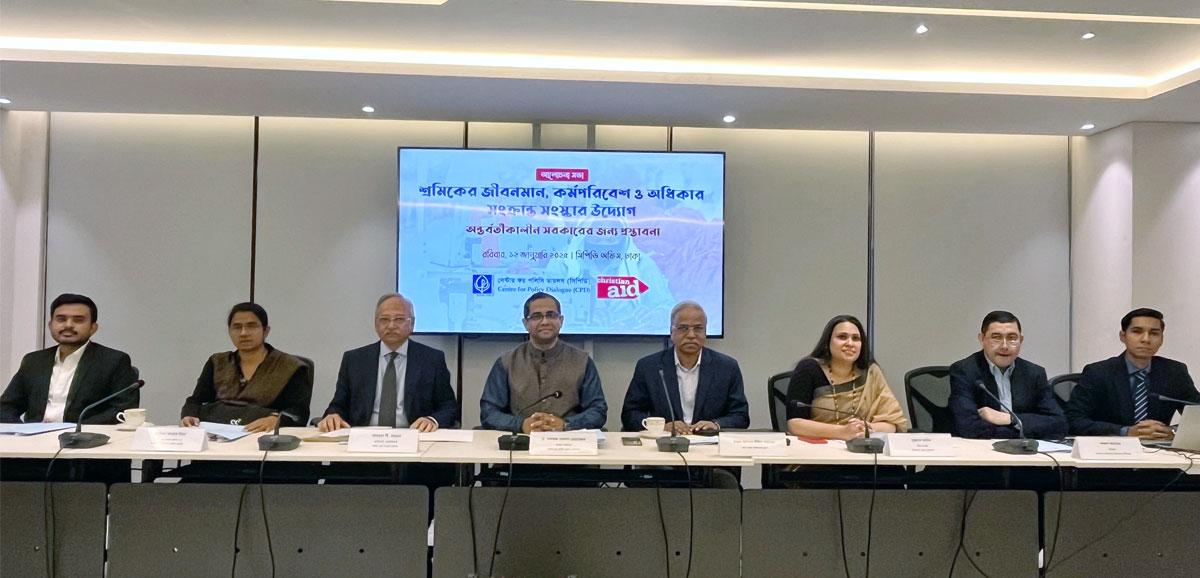
Bangladesh’s workforce endures persistent challenges that urgently require comprehensive reform to improve living standards and workplace conditions. Acknowledging this need, the Interim Government established the Labour Reform Commission in November 2024, focusing on critical issues such as workers’ rights, safety, and fair wages. This initiative follows extensive advocacy from labour rights activists, trade unions, and Civil Society Organisations (CSOs), emphasising the pressing need for legislative and practical changes. To further this cause, the Centre for Policy Dialogue (CPD) has put forth a detailed recommendations for the Labour Reform Commission, aiming to implement significant reforms that ensure worker protection and promote fair labour practices across industries.
This discussion took place at a media briefing titled ‘Reforms in Workers’ Livelihood, Workplace Safety and Rights Issues: An Agenda for the Interim Government’, jointly organised by the CPD and Christian Aid on Sunday, 12 January 2025.
While moderating the session, Dr Khondaker Golam Moazzem, Research Director at CPD, highlighted, “Bangladesh has struggled to ensure fair wages for its workers. The coverage of the Minimum Wage Board (MWB) has remained limited, stagnant at 42 industries for an extended period. Although there are claims that four additional industries are in the process of being included, no tangible progress has been observed so far.”
A detailed reform agenda to assist the commission was presented by Mr Tamim Ahmed, Senior Research Associate at CPD, while delivering the keynote presentation. Among its priorities is the need to ensure fair wages. Many sectors still operate with outdated and alarmingly low minimum wages, and informal workers remain excluded from regulations. Recommendations include expanding wage coverage to all industries, introducing a national minimum wage, and enforcing timely payments with penalties for delays.
Occupational safety also requires urgent attention. Despite progress in the Readymade Garment (RMG) sector, other industries remain unsafe, with underreported accidents and weak enforcement of safety standards. CPD suggested mandatory safety officers in workplaces, unannounced inspections, and specialised medical facilities for high-risk industries like tanneries and shipbreaking.
The right to unionise remains restricted, particularly for workers in Export Processing Zones (EPZs), where trade unions are prohibited. CPD calls for the unification of labour laws, greater protections for union activists, and lowering the threshold for strike approvals to empower workers.
Social protection remains another gap. Informal workers lack access to essential schemes like health insurance, pensions, and unemployment benefits. The CPD recommends ratifying international conventions, expanding existing schemes, and introducing maternity and disability insurance to support vulnerable workers.
Child labour and forced labour persist as critical issues. Current penalties for violations are inadequate, and forced labour victims often lack access to shelters or legal protections. The CPD advocates for stronger laws, better enforcement, and support systems for victims.
Gender equality is also a concern, with women facing barriers in workplace safety, childcare, and leadership opportunities. To address this, the CPD recommends equal pay legislation, anti-discrimination laws, and mandatory daycare facilities at workplaces.
‘Ensuring the dignity and safety of every worker is the cornerstone of our mission’, stated Mr Syed Sultan Uddin Ahmed, Chairman, Workers’ Rights Commission. ‘We are dedicated to advancing reforms that truly reflect the needs and rights of our workforce’.
Mr Kamran T. Rahman, President of Metropolitan Chamber of Commerce and Industry (MCCI) remarked ‘Collaboration between industry and government is essential to fostering a business environment that not only grows economically but also respects and upholds labor rights’.
‘Our goal is to see every garment worker receive fair wages and safe working conditions’, underscored Taslima Akter Lima, President, Bangladesh Garments Sramik Sanghati. ‘It is time for the industry to transform promises into action’.
Mr Farooq Ahmed, Secretary-General & CEO at Bangladesh Employers’ Federation emphasised ‘We are at a pivotal moment where improving labor conditions can directly contribute to our competitiveness on a global scale. It is imperative that we engage in meaningful reforms’.
Ms Nuzhat Jabin, Programme Manager, Christian Aid Bangladesh remarked ‘Through strategic partnerships and sustained advocacy, we aim to ensure that labor reforms not only take hold but also pave the way for greater equity and justice in the workplace’.
An open-floor Q&A session with journalists from both print and electronic media followed the discussion.


